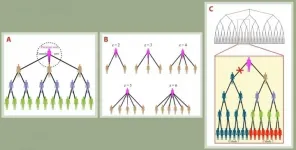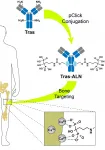Being Anglo-Saxon was a matter of language and culture, not genetics
New evidence to answer the question 'who exactly were the Anglo-Saxons?'
2021-06-23
(Press-News.org) A new study from archaeologists at University of Sydney and Simon Fraser University in Vancouver, has provided important new evidence to answer the question "Who exactly were the Anglo-Saxons?"
New findings based on studying skeletal remains clearly indicates the Anglo-Saxons were a melting pot of people from both migrant and local cultural groups and not one homogenous group from Western Europe.
Professor Keith Dobney at the University of Sydney said the team's results indicate that "the Anglo-Saxon kingdoms of early Medieval Britain were strikingly similar to contemporary Britain - full of people of different ancestries sharing a common language and culture".
The Anglo-Saxon (or early medieval) period in England runs from the 5th-11th centuries AD. Early Anglo-Saxon dates from around 410-660 AD - with migration occurring throughout all but the final 100 years (ie 410-560AD).
Studying ancient skulls
Published in PLOS ONE, the collaborative study by Professor Dobney at University of Sydney and Dr Kimberly Plomp and Professor Mark Collard at Simon Fraser University in Vancouver, looked at the three-dimensional shape of the base of the skull.
"Previous studies by palaeoanthropologists have shown that the base of the human skull holds a shape signature that can be used to track relationships among human populations in a similar way to ancient DNA," Dr Plomp said. "Based on this, we collected 3D data from suitably dated skeletal collections from Britain and Denmark, and then analysed the data to estimate the ancestry of the Anglo-Saxon individuals in the sample."
The researchers found that between two-thirds and three-quarters of early Anglo-Saxon individuals were of continental European ancestry, while between a quarter and one-third were of local ancestry.
When they looked at skeletons dated to the Middle Anglo-Saxon period (several hundred years after the original migrants arrived), they found that 50 to 70 percent of the individuals were of local ancestry, while 30 to 50 percent were of continental European ancestry, which probably indicates a change in the rate of migration and/or local adoption of culture over time.
"These findings tell us that being Anglo-Saxon was more likely a matter of language and culture, not genetics," Professor Collard said.
The debate about Anglo-Saxons
Although Anglo-Saxon origins can clearly be traced to a migration of Germanic-speaking people from mainland Europe between the 5th and 7th centuries AD, the number of individuals who settled in Britain is still contested, as is the nature of their relationship with the pre-existing inhabitants of the British Isles, most of whom were Romano-Celts.
The ongoing and unresolved argument is whether hordes of European invaders largely replaced the existing Romano-British inhabitants, or did smaller numbers of migrants settle and interact with the locals, who then rapidly adopted the new language and culture of the Anglo-Saxons?
"The reason for the ongoing confusion is the apparent contradiction between early historical texts (written sometime after the events that imply that the newcomers were both numerous and replaced the Romano-British population) and some recent biomolecular markers directly recovered from Anglo-Saxon skeletons that appears to suggest numbers of immigrants were few," said Professor Dobney.
"Our new data sits at the interface of this debate and implies that early Anglo-Saxon society was a mix of both newcomers and immigrants and, instead of wholesale population replacement, a process of acculturation resulted in Anglo-Saxon language and culture being adopted wholesale by the local population."
"It could be this new cultural package was attractive, filling a vacuum left at the end of the Roman occupation of Britain. Whatever the reason, it lit the fuse for the English nation we have today - still comprised of people of different origins who share the same language," Professor Dobney said.
INFORMATION:
[Attachments] See images for this press release:

ELSE PRESS RELEASES FROM THIS DATE:
2021-06-23
Newspapers regularly carry stories of terrifying shark attacks, but in a paper published today, Oxford-led researchers reveal their discovery of a 3,000-year-old victim - attacked by a shark in the Seto Inland Sea of the Japanese archipelago.
The research in Journal of Archaeological Science: Reports, shows that this body is the earliest direct evidence for a shark attack on a human and an international research team has carefully recreated what happened - using a combination of archaeological science and forensic techniques.
The grim discovery of the victim was made by Oxford researchers, J. Alyssa White and Professor Rick Schulting, while investigating evidence for violent trauma on the skeletal remains of prehistoric hunter-gatherers at ...
2021-06-23
SAN ANTONIO, June 23, 2021 - A typical Western high-fat diet can increase the risk of painful disorders common in people with conditions such as diabetes or obesity, according to a groundbreaking paper authored by a team led by The University of Texas Health Science Center at San Antonio, also referred to as UT Health San Antonio.
Moreover, changes in diet may significantly reduce or even reverse pain from conditions causing either inflammatory pain - such as arthritis, trauma or surgery - or neuropathic pain, such as diabetes. The novel finding could help treat chronic-pain patients by simply altering diet or developing drugs that block ...
2021-06-23
By José Tadeu Arantes | Agência FAPESP – Mathematical models that describe the physical behavior of magnetic materials can also be used to describe the spread of the novel coronavirus that causes COVID-19.
This is the conclusion of a study conducted in Brazil by researchers affiliated with São Paulo State University (UNESP) in Rio Claro and Ilha Solteira and reported in an article published in Physica A: Statistical Mechanics and its Applications.
The study was part of a project led by Mariano de Souza, a professor at UNESP’s Rio Claro Physics Department, and of the PhD research of Isys Mello, whose thesis advisor is Souza, last author of the article. Another co-author is Antonio Seridonio, a professor at UNESP’s Ilha Solteira Physics ...
2021-06-23
Only 1 in 10 older adults in a large national survey who were found to have cognitive impairment consistent with dementia reported a formal medical diagnosis of the condition.
Using data from the Health and Retirement Study to develop a nationally representative sample of roughly 6 million Americans age 65 or older, researchers at the University of Michigan, North Dakota State University and Ohio University found that 91% of people with cognitive impairment consistent with dementia told questioners they had a formal medical diagnosis of Alzheimer's disease or dementia.
"(The discrepancy) was higher than I was expecting," ...
2021-06-23
Flavoring can change how the brain responds to e-cigarette aerosols that contain nicotine, according to Penn State College of Medicine researchers. Andrea Hobkirk and her team used functional magnetic resonance imaging (MRI) to understand how the brain's reward areas react to e-cigarette aerosol with and without flavor.
"There are nearly 12 million e-cigarette users in the United States," Hobkirk, an assistant professor of psychiatry and behavioral health at Penn State College of Medicine, said. "The vast majority use e-cigarettes with menthol, mint, fruity and dessert-type flavors. Although regulations that limit the sale of flavored e-cigarettes may help curb use among youth, they might also stop adults from using e-cigarettes as a smoking ...
2021-06-23
Researchers from Bentley University have been exploring how readers at partisan news sites respond to news events that challenge their worldview.
In a forthcoming paper in the journal ACM Transactions on Social Computing, they report results of a study that examines reader comments on stories surrounding the 2017 Roy Moore Alabama senate race at two partisan news sites: a left-leaning news site (Daily Kos) and a right-leaning news site (Breitbart). They consider the alleged sexual misconduct of Mr. Moore as a challenging news event for the right-leaning readers; and the subsequent nomination of Mr. Moore as the Republican candidate as a challenging news event for the left-leaning readers.
Their analysis identifies the obstacles that readers face as they try to make sense ...
2021-06-23
NEW YORK CITY, June 23, 2021 -- From amoebas to zebras, all living things evolve. They change over time as pressures from the environment cause individuals with certain traits to become more common in a population while those with other traits become less common.
Cancer is no different. Within a growing tumor, cancer cells with the best ability to compete for resources and withstand environmental stressors will come to dominate in frequency. It's "survival of the fittest" on a microscopic scale.
But fitness -- how well suited any particular individual is to its environment -- isn't set in stone; it can change when the environment changes. The cancer cells that might do best in an environment saturated ...
2021-06-23
SAN FRANCISCO, CA--June 23, 2021--A healthy heart is a pliable, ever-moving organ. But under stress--from injury, cardiovascular disease, or aging--the heart thickens and stiffens in a process known as fibrosis, which involves diffuse scar-like tissue. Slowing or stopping fibrosis to treat and prevent heart failure has long been a goal of cardiologists.
Now, researchers at Gladstone Institutes have discovered a master switch for fibrosis in the heart. When the heart is under stress, they found, the gene MEOX1 is turned on in cells called fibroblasts, spurring fibrosis. Their new study, published in the journal Nature, suggests that blocking ...
2021-06-23
HOUSTON - (June 23, 2021) - Bone cancer is hard to treat and prone to metastasis. Research teams at Rice University and Baylor College of Medicine have a new strategy to attack it.
Chemist Han Xiao at Rice and biologist Xiang Zhang at Baylor and their labs have developed an antibody conjugate called BonTarg that delivers drugs to bone tumors and inhibits metastasis.
Their open-access study, which appears in Science Advances, shows how Xiao's pClick technology can be used to link bone-targeting antibodies and therapeutic molecules.
In experiments, they used pClick to couple a molecule used to treat osteoporosis, alendronate, with the HER2-targeting antibody trastuzumab used to treat breast cancer and found it significantly enhanced the concentration ...
2021-06-23
Most survivors of squamous cell head and neck cancers report that their sense of taste is dulled, changed or lost during radiation treatment, causing them to lose interest in eating and diminishing their quality of life.
In a study of taste and smell dysfunction with 40 cancer survivors, scientists at the University of Illinois Urbana-Champaign found that the tips of these individuals' tongues were significantly less sensitive to bitter, salty or sweet tastes than peers in the control group who had never been diagnosed with cancer.
In a paper published in the journal Chemical Senses, the U. of I. team said this diminished taste sensitivity suggested that the taste ...
LAST 30 PRESS RELEASES:
[Press-News.org] Being Anglo-Saxon was a matter of language and culture, not genetics
New evidence to answer the question 'who exactly were the Anglo-Saxons?'





